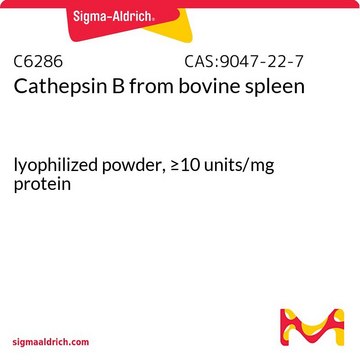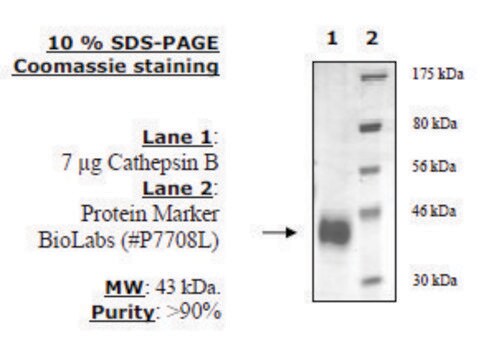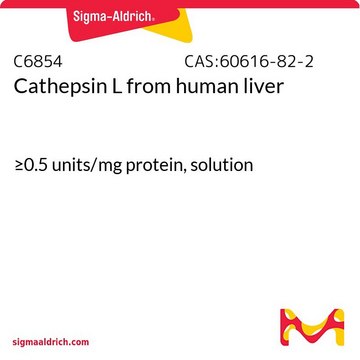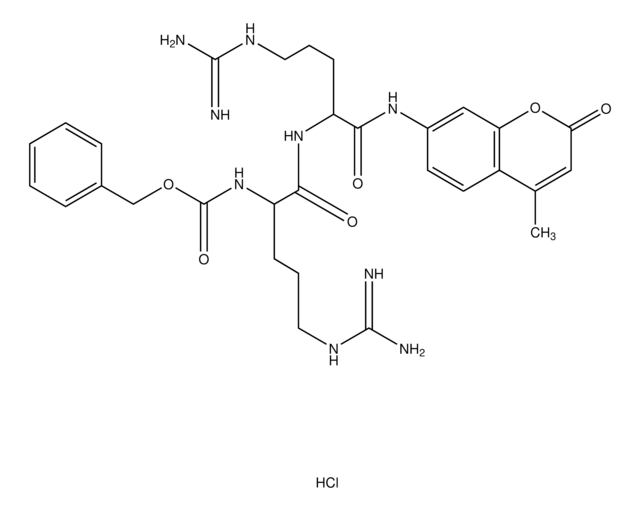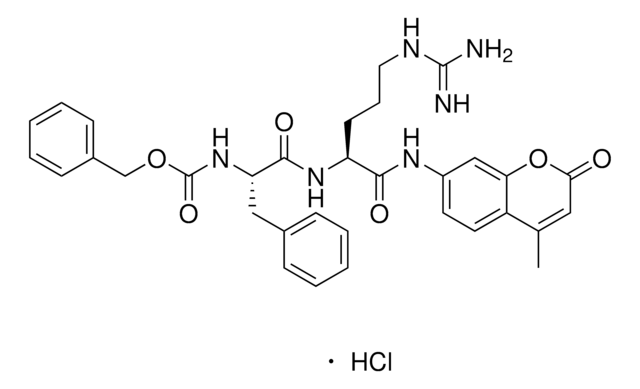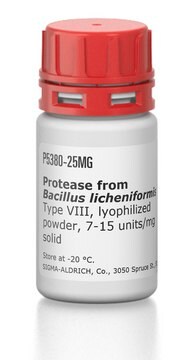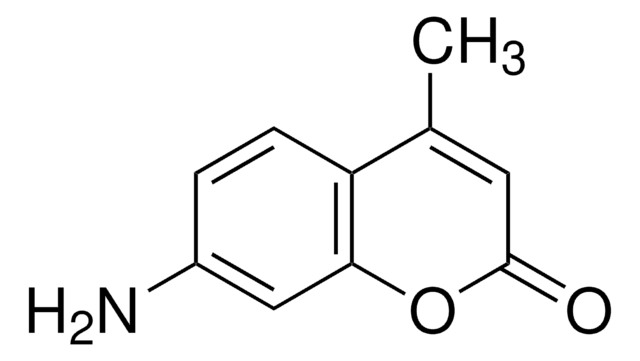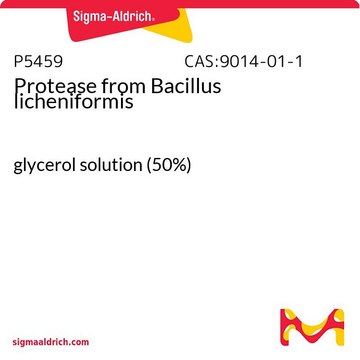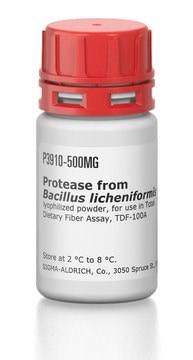C0150
Cathepsin B from human placenta
lyophilized powder, ≥5 units/mg protein
Sinônimo(s):
Cathepsin B1
Faça loginpara ver os preços organizacionais e de contrato
About This Item
Número CAS:
Número MDL:
Código UNSPSC:
12352204
NACRES:
NA.54
Produtos recomendados
forma
lyophilized powder
Nível de qualidade
atividade específica
≥5 units/mg protein
peso molecular
24.5 kDa
composição
Protein, ~50% Lowry
solubilidade
H2O: soluble 1.0 mg/mL, clear
nº de adesão UniProt
temperatura de armazenamento
−20°C
Informações sobre genes
human ... CTSB(1508)
Descrição geral
Cathepsin B is encoded by the gene CTSB and is located in the human chromosome at 8p23.1. Cathepsin B is a lysosomal proteolytic enzyme of cysteine protease family. It is present in all mammalian cells. It is essential for the intracellular protein turnover.
Aplicação
Cathepsin B from human placenta has been used in the in vitro digestion of modified myelin oligodendrocyte glycoprotein (MOG). It has also been used in determining the effect of cysteine protease inhibitors.
Cathepsin B is a lysosomal cysteine proteinase which hydrolyzes proteins with a broad specificity for peptide bonds. Cathepsin B may be a useful tool in Alzheimer′s research, as it may have a role in the natural defense against the disease . Cathepsin B may be used to cleave procaspase 1 and procaspase 11, and to induce apoptosis in digitonin-permeabilized cells.
Ações bioquímicas/fisiológicas
Cathepsin B preferentially cleaves at the caboxyl side of Arg-Arg bonds in small molecule substrates. Cathepsin B has been shown to degrade β-amyloid precursor protein into harmless fragments . Cathepsin B inhibition has been shown to limit bone metastasis in breast cancer .
Cathepsin B has been found to cleave procaspase 1 and procaspase 11 and to induce apoptosis in digitonin-permeabilized cells. Translocation of cathepsin B from the cytoplasm to the nucleus contributes to bile salt induced apoptosis of rat hepatocytes. Levels of cathepsin B in PC12 cells significantly decrease 12 to 24 hours after apoptosis is induced.
Definição da unidade
One unit will liberate 1 nanomole of 7-amino-4-methylcoumarin from Z-Arg-Arg 7-amido-4-methylcoumarin per min at pH 6.0 at 40 °C.
forma física
Lyophilized powder containing phosphate buffer salts
Nota de preparo
Dissolves in water at 1 mg/mL concentration, yieliding a clear solution.
inibidor
Nº do produto
Descrição
Preços
Código de classe de armazenamento
11 - Combustible Solids
Classe de risco de água (WGK)
WGK 3
Ponto de fulgor (°F)
Not applicable
Ponto de fulgor (°C)
Not applicable
Certificados de análise (COA)
Busque Certificados de análise (COA) digitando o Número do Lote do produto. Os números de lote e remessa podem ser encontrados no rótulo de um produto após a palavra “Lot” ou “Batch”.
Já possui este produto?
Encontre a documentação dos produtos que você adquiriu recentemente na biblioteca de documentos.
Os clientes também visualizaram
Cathepsins B, H, L and cysteine protease inhibitors in malignant prostate cell lines, primary cultured prostatic cells and prostatic tissue
Friedrich B, et al.
European Journal of Cancer, 35(1), 138-144 (1999)
Viktorija Herceg et al.
Molecules (Basel, Switzerland), 25(18) (2020-09-24)
Cyclopeptidic chemotherapeutic prodrugs (cPCPs) are macromolecular protease-sensitive doxorubicin (DOX) prodrugs synthesized from a cyclodecapeptidic scaffold, termed Regioselectively Addressable Functionalized Template (RAFT). In order to increase the chemotherapeutic potential of DOX and limit its toxicity, we used a Cathepsin B (Cat
Mixed gastric carcinomas show similar chromosomal aberrations in both their diffuse and glandular components.
Carvalho B, et al.
Analytical Cellular Pathology, 28(5-6), 283-294 (2006)
Scavenger Receptor A Mediates the Clearance and Immunological Screening of MDA-Modified Antigen by M2-Type Macrophages
Warnecke A, et al.
Neuromolecular Medicine, 19(4), 463-479 (2017)
Sarah Mueller-Steiner et al.
Neuron, 51(6), 703-714 (2006-09-20)
Alzheimer's disease (AD) may result from the accumulation of amyloid-beta (Abeta) peptides in the brain. The cysteine protease cathepsin B (CatB) is associated with amyloid plaques in AD brains and has been suspected to increase Abeta production. Here, we demonstrate
Nossa equipe de cientistas tem experiência em todas as áreas de pesquisa, incluindo Life Sciences, ciência de materiais, síntese química, cromatografia, química analítica e muitas outras.
Entre em contato com a assistência técnica
